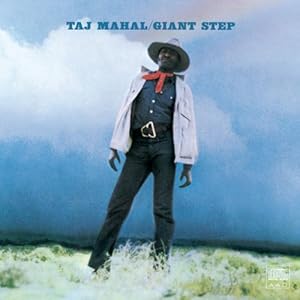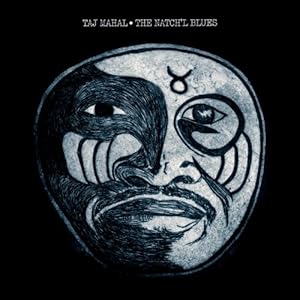It’s not fair to call Taj Mahal a blues artist. He
is, but he’s so much more. For years I
stayed away from him because I just wasn’t crazy about electric blues. I’m
still not, honestly. A lot of it sounds to me like rock and roll stuck in a low
gear. So when I snatched up a load of old records from my uncle on a recent
trip back to my hometown, I initially looked down my nose at the three Taj
Mahal albums in my haul. It took me a week to get around to listening to them.
I chose
Giant Step/De Ole Folks at Home to
start with because of the novelty of a double record that’s actually two
separate records bound together in a gatefold. The first record,
Giant Step, is electric with a full
band. The opening track, “Ain’t Gwine Whistle Dixie Anymo’,” is a short and wistful
whistling-and-guitar tune that’s nice and mellow. It’s like a nice shoulder rub
to ease you into the listening experience. The next song, the title track, is
similarly calming but a little more upbeat, with Mahal urging you to “take a
giant step outside your mind.” I wouldn’t peg either of these numbers as blues.
Forced to categorize, I’d say, “easy-going American music.” The third tune,
“Give Your Woman What She Wants,” is straight-up electric blues. If I were more
confident in my knowledge, I might say Chicago-style. It’s the kind I usually
hate—macho, hard-driving stuff. But here, set in contrast to the first two
songs, it takes on a nice shine. Plus there’s a quality to Mahal’s voice, a
sort of soft raspy-ness and soulfulness, that mitigates the testosterone
overdrive of the genre and carries the mellow vibe through from the first two
songs. Side two opens with a cover of “Six Days on the Road” done up in the
groovy, high-speed way the Flying Burrito Brothers did it, except Mahal seems
to be having more fun with it, like he’s getting a big ol’ kick out of being a
black dude belting out a country trucker song.
The second
record,
De Ole Folks at Home, is
acoustic. Like its companion, it gathers a wide range of sound and unifies the
pieces. It opens with a rhythmic work crew song, slides into an instrumental
slide guitar number that calls to mind Blind Willie Jefferson by way of Ry
Cooder, breezes into a banjo number with a tempo that’s reminiscent of blues
but not quite. The blues are always present on these records, but they’re not
always front and center. They’re more like the DNA that underlie and bind all
the songs together.
After
spinning these two discs, I was hooked on Taj Mahal, so I reached for another
record and grabbed The Natch’l Blues.
I was leery, fearful that this would be the slogging blues record I dread. And
true to its name, it’s more consistently bluesy. It came out a year ahead of Giant Step/De Ole Folks at Home, and it
was just his second record, so maybe he wasn’t quite ready to stretch out so
much. Still, he pushed the boundaries a bit, especially on “Corinna” and “You
Don’t Miss Your Water,” both of which drift into a soul territory, and even a
little bit of gospel on the latter. The bluesy numbers have the kind of hippy
swing to them that you’d expect from a record released in 1968, the notes bent
ever so slightly, as if to suggest the silhouette of a go-go dancer shaking on
a table top. And throughout there’s still that voice that’s soft and hard-edged
all at the same time, and has a way of finding the soul of the melody and
hitting you where you live. This is blues even a blues hater can love.



No comments:
Post a Comment